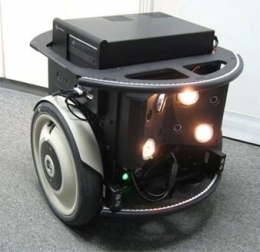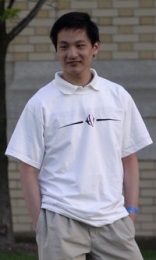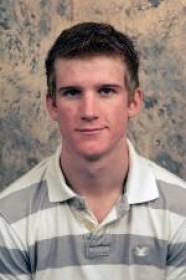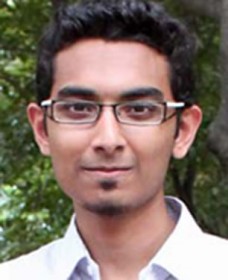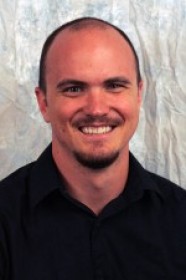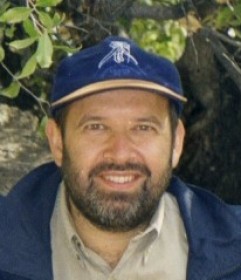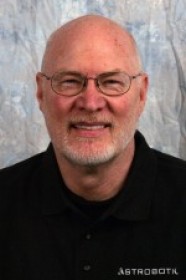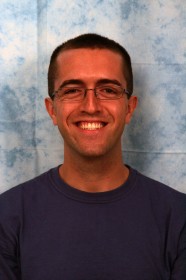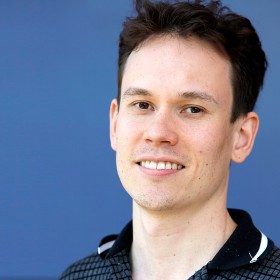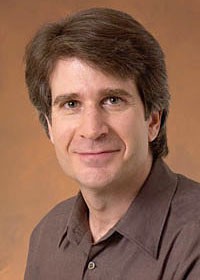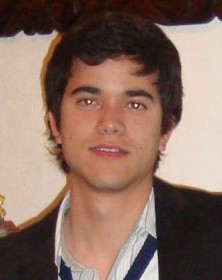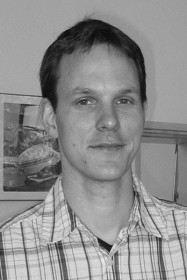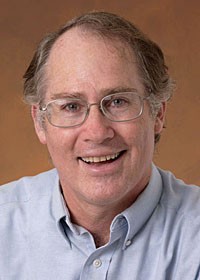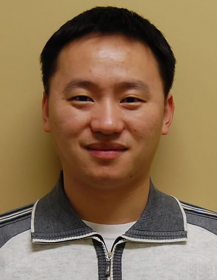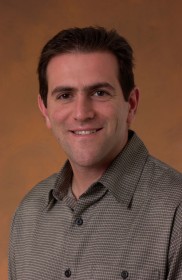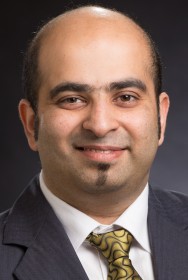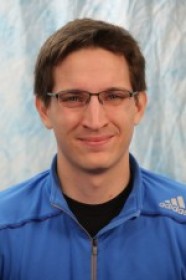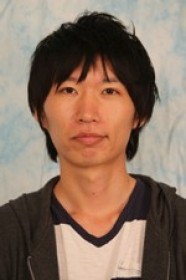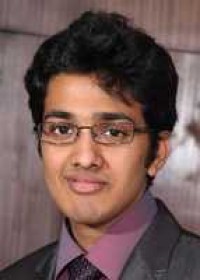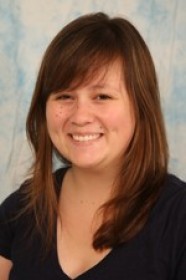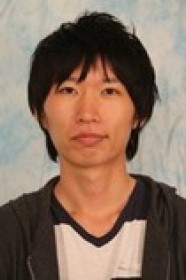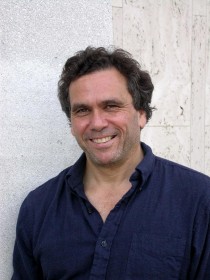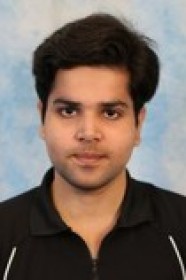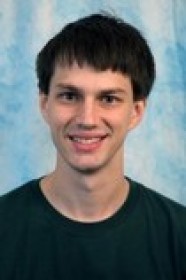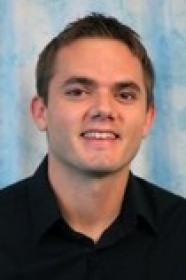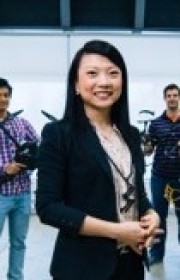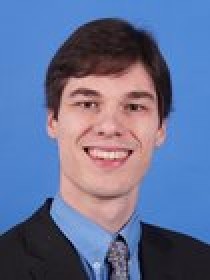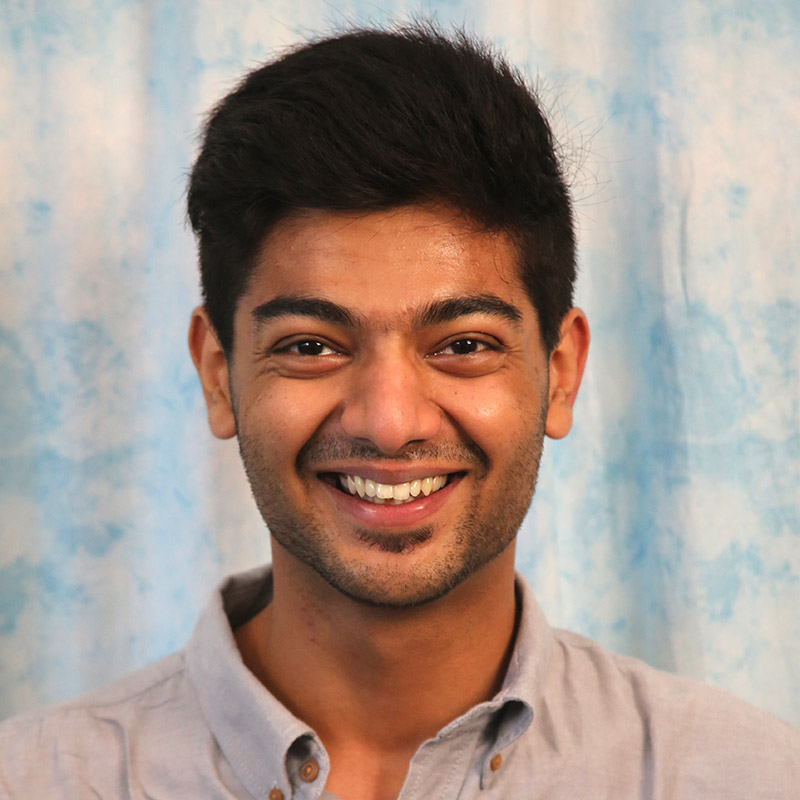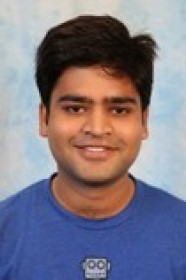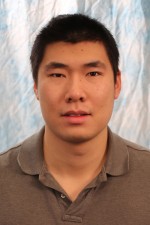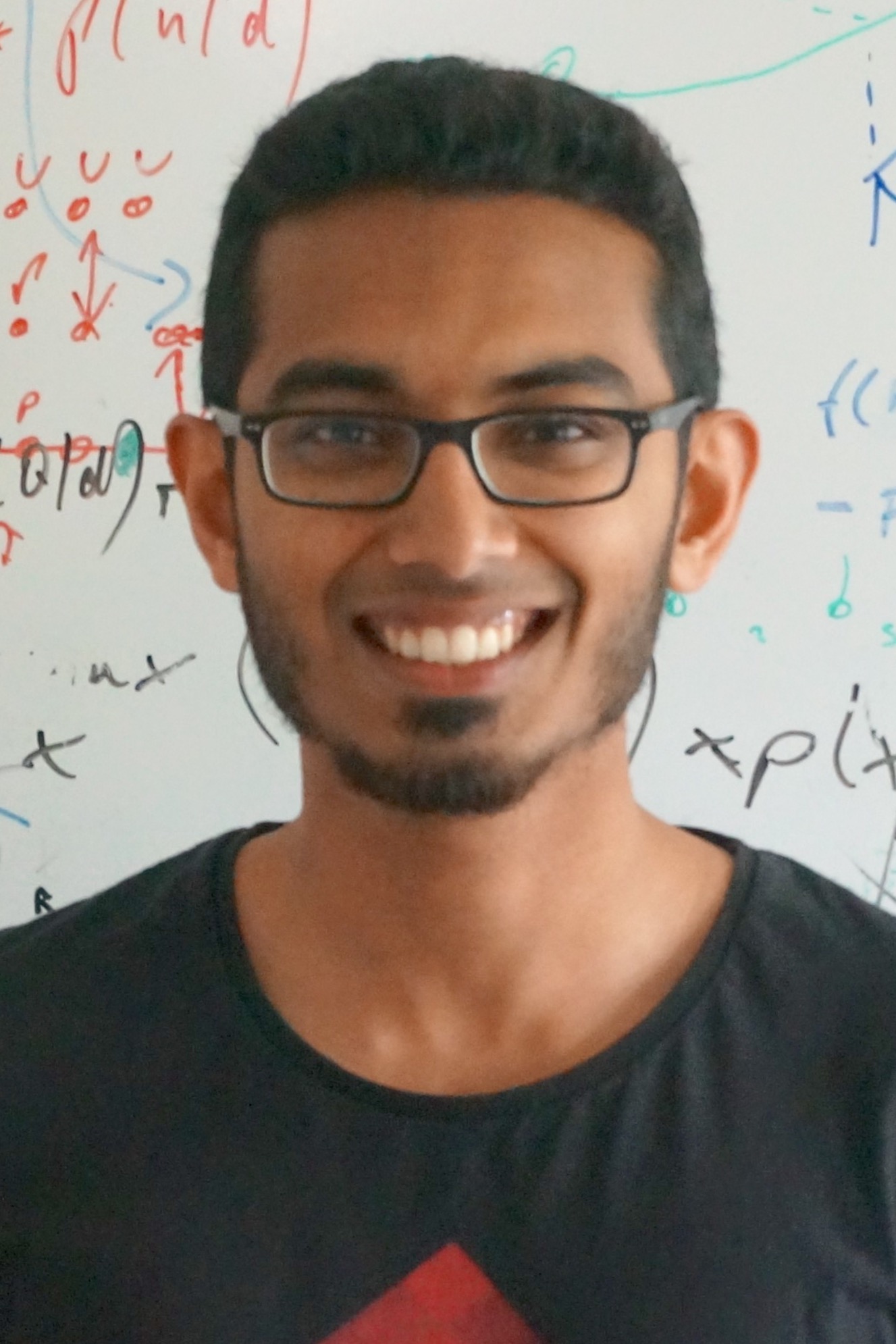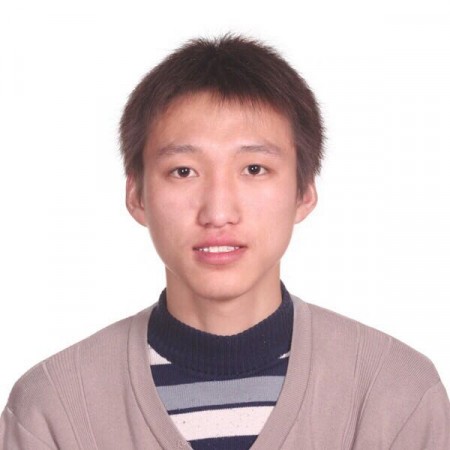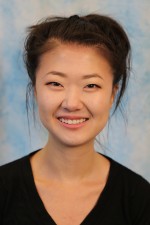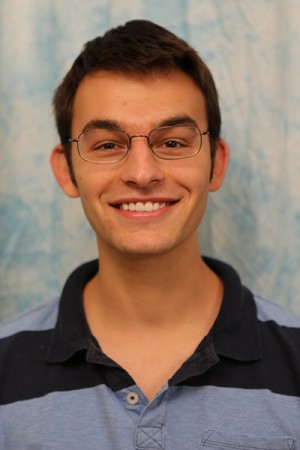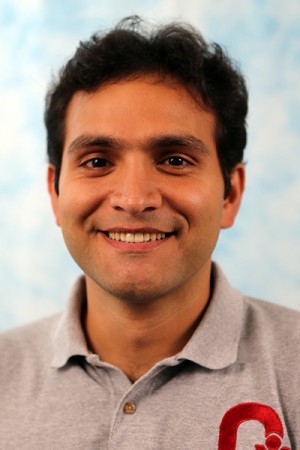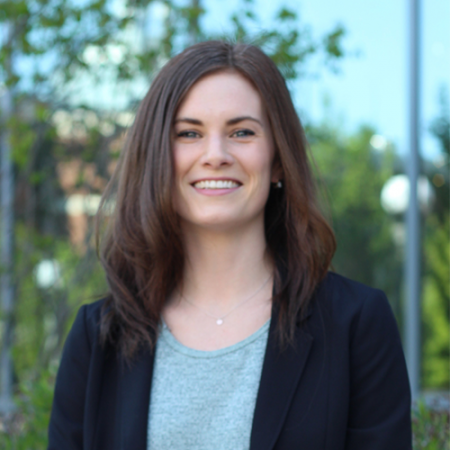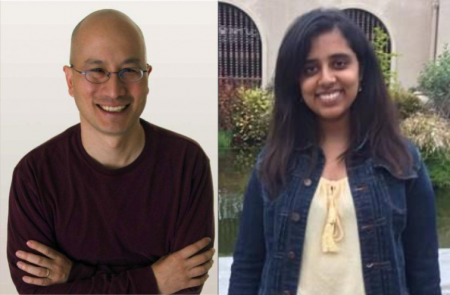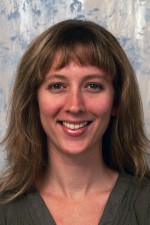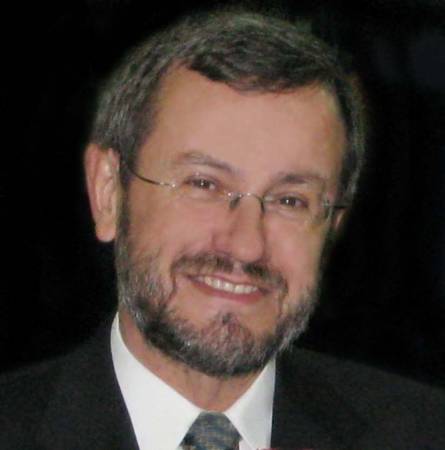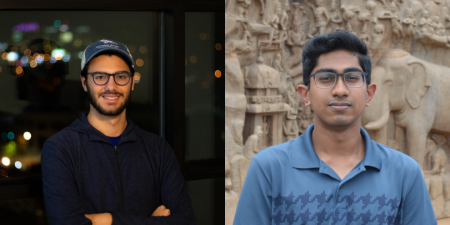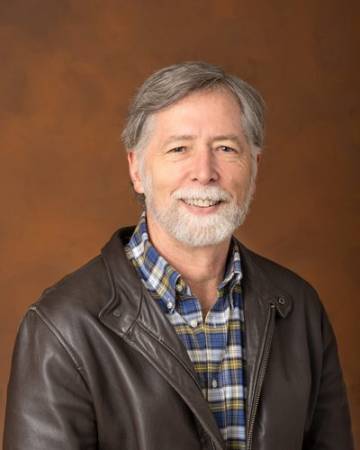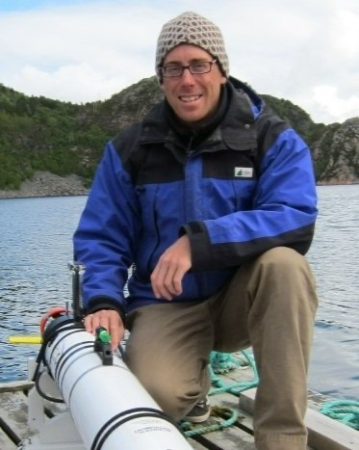Field Robotics Center Seminar
Imitation Learning for Autonomous Navigation in Complex Natural Terrain
Event Location: NSH 1109Bio: David Silver is a PhD candidate at the Robotics Institute, researching robust mobile robot navigation systems. He has a B.S. in Computer Science and a M.S. in Robotics from CMU. Previously, he has worked with the TSLAM and Subterranean Robotics groups at CMU, and the UPI program at NREC. He is [...]
3-D Stereo Vision SLAM for Autonomous Mapping and Navigation (live demonstration)
Event Location: NSH 3305Bio: Pearse received the B.S. in electrical engineering from Massachusetts Institute of Technology in 1989 and the M.S. in electrical engineering from the University of California, San Diego in 1994. Pearse Ffrench is a project manager and senior technical staff member at Vision Robotics. He has been developing 3-D stereo vision SLAM [...]
Camera and LIDAR Fusion for Mapping in Dark Environments
Event Location: NSH1109Bio: Uland Wong is an RI PhD candidate in Field Robotics advised by Red Whittaker. His research interests are 3D perception, calibrated imaging in dark environments and exploration robotics. His work has resulted in the development and commercialization of miniature borehole LIDAR and actively-illuminated vision sensors for mapping subterranean voids. He received his [...]
Characterization and Control of a Hopping Robot with Omni-Orientational Mobility for Rough Terrain
Event Location: NSH 1109Bio: Bryan is a Masters student in the Robotics Institute. He is conducting his thesis research at the National Robotics Engineering Center under the guidance of Dr. Dimi Apostolopoulos and plans to graduate in December 2009. His interests include mobile robot system design, design of mechanisms for controllability, and control for unique [...]
Target Tracking, Geolocation, and Search with Small UAVs
Event Location: NSH 1109Bio: Michael is a Ph.D student at the Robotics Institute.Abstract: Cooperative surveillance using teams of unmanned aerial vehicles (UAVs) is a fruitful area of study given the many real-world applications and open research problems it offers. In this talk I will present our vision for such teams in an air-ground collaboration context [...]
Global Scan-Matching for Incremental Map Construction Using Line Features
Event Location: NSH 1109Bio: Don Burnette is a Ph.D. student at the Robotics Institute. Abstract: I propose a laser based odometry algorithm which utilizes line feature based scan matching to determine the pose of a robot in an unknown, structured environment, while incrementally building a map of that environment. The algorithm is tested on a variety of data sets, using different types of laser range scanners, in various real world environments. The algorithm incrementally generates line-feature based maps in real-time as the robot moves throughout the environment, [...]
Classification of Mars Terrain Using Multiple Data Sources
Event Location: NSH 1109Bio: Alan Kraut is a student in the Robotics Institute, conducting research under David Wettergreen. His current research interests focus on the application of machine learning to computer vision for space robotics. He received a Bachelor of Science degree in Engineering from Harvey Mudd College in 2008.Abstract: Data about Mars are being [...]
Design and Development of a Multi-Hop Routing Protocol for Distributed Sensing Applications
Event Location: GHC 2109Bio: Abhinav Valada is a Research Assistant in the Field Robotics Center at Carnegie Mellon University. He is working on the Distributed SensorWebs project under Dr. George Kantor. His current research interests focus on algorithms for multi-agent coordination, scheduling and control. He received a Bachelor of Technology degree in Electronics and Instrumentation [...]
Self-Aware Helicopters: A New Era for Vertical Flight
Event Location: GHC 2109Bio: Lyle specializes in perception systems for flying vehicles of all sizes. He has worked as a Research Engineer at the CMU Field Robotics Center for the past five years. He has also worked on perception and mobility systems for robots at JPL and IBM. At Caltech, he completed a B.S. in [...]
Mission control of autonomous vehicles based on time logic framework
Event Location: GHC 2109Bio: Dr. Bassi is an engineer, researcher, entrepreneur and consultant with a broad experience in automation and business intelligence areas. He graduated from Universidad de Chile (BSc EE, PEE and MSc EE) and University of Southern California (PhD Computer Science). He has held academic positions at the U. of Chile (Dept. Industrial [...]
Map-Merging-Free Connectivity Positioning for Distributed Robot Teams
Event Location: GHC 2109Bio: Somchaya Liemhetcharat is a Ph.D. student at the Robotics Institute, under Prof. Manuela Veloso. He is interested in multi-robot coordination, in particular the areas of information sharing, role assignment and modeling of capabilities.Abstract: We consider a set of static towers with communication capabilities, but not within range of each other due [...]
Landing the Lunar X-Prize
Event Location: NSH 3305Bio: William “Red” Whittaker is the Fredkin professor at Carnegie Mellon's Robotics Institute. He is a member of the National Academy of Engineering and a fellow of the American Association for Artificial Intelligence. He served on the National Academy of Sciences Space Studies Board. Science Digest named Whittaker one of the top [...]
POSTPONED
Event Location: GHC2109
Autonomous Inspection and the Benefit of Adaptivity
Event Location: NSH3305Bio: Geoffrey A. Hollinger is a Postdoctoral Research Associate in the Robotic Embedded Systems Laboratory and Viterbi School of Engineering at the University of Southern California. He is currently interested in adaptive sensing and distributed coordination for robots operating with limited communication. He has also worked on multi-robot search at Carnegie Mellon University, [...]
Automated Estimation of Grapevine Yield and Canopy Size for Precision Vineyard Management
Event Location: GHC2109Bio: Stephen is a Project Scientist at the Robotics Institute and was a PostDoc at the RI from 2008-2010. Prior to arriving at the RI he completed his PhD in Australia conducting the research jointly at the Commonwealth Science and Industry Research Organisation and the University of Queensland. He has worked on a [...]
Distributed Algorithms for Multi-robot Localization
Event Location: NSH1507Bio: Alberto Speranzon received a "Laurea" degree in Computer Engineering from University of Padova, Italy, in November 2000. In May 2006 he received a Ph.D. in Automatic Control from the School of Electrical Engineering, Royal Institute of Technology, Stockholm, Sweden. Between May 2006 and October 2006 he was post-doc at the same institute. [...]
Empathy in Virtual Agents and Robots
Event Location: 3305 Newell-Simon HallBio: Professor Ana Paiva is a research group leader at INESC-ID and an Associate Professor at Instituto Superior Técnico, Technical University of Lisbon. She is well known in the area of Virtual Agents, Artificial Intelligence Applied to Education and Affective Computing. After her PhD in the UK (University of Lancaster), she [...]
Complementary Flyover and Rover Sensing for Modeling of Planetary Features
Event Location: GHC2109Bio: Heather Jones is a PhD student at the Robotics Institute. Before coming to Carnegie Mellon, she earned bachelors degrees in engineering and computer science from Swarthmore College and worked for nearly three years at NASA's Johnson Space Center. Abstract: This talk presents complementary flyover and surface exploration for reconnaissance of planetary point [...]
State Estimation from Visual-Inertial Data in Unstructured Environments
Event Location: GHC2109Bio: Andrew Chambers is a Masters student at the Robotics Institute, advised by Sanjiv Singh. He holds a B.S. in Electrical Engineering from the University of Southern California. Before coming to the RI, he worked as an electrical engineer at iRobot in Boston, MA, where he designed hardware for the bomb disposal robots.Abstract: [...]
Simulating global motion detection in Macaque visual cortex and it’s application to optical flow
Event Location: GHC2109Bio: Michael Furlong is a Ph.D candidate in the Field Robotics Center working on science autonomy.Abstract: Pattern cells in area V5/MT represent an intriguing step in the visual hierarchy, whereby neurons become sensitive to global motion, rather than simply to the motion of constituent components, cells in the primary visual cortex (V1). A [...]
RatSLAM: Using Models of Rodent Hippocampus for Robot Navigation
Event Location: GHC2109Bio: I hold a PhD in Electrical Engineering and a Bachelor of Engineering from the University of Queensland, awarded in 2006 and 2002 respectively. I recently joined the Queensland University of Technology as Lecturer, having previously worked as a Postdoctoral Research Fellow at QUT and before that for three years as a Research [...]
2012 Robotics Activities at JPL
Event Location: GHC 2109Bio: Richard Volpe is Manager of the Mobility and Robotic Systems Section of NASA's Jet Propulsion Laboratory, California Institute of Technology. The section is a team of over 90 robotics engineers doing research and spaceflight implementation of robotic systems for Roving, Digging, Ballooning, Drilling, and other modes of in-situ planetary exploration. In [...]
Landing the Lunar X Prize: Rovers and Rockets from CMU to the Moon
Event Location: GHC 4307Bio: William “Red” Whittaker is the Fredkin University Professor of Robotics at Carnegie Mellon's Robotics Institute. He has developed dozens of robots, breaking new ground in autonomous vehicles, field robotics, space exploration, mining and agriculture. Whittaker developed the robots that cleaned up the Three-Mile Island nuclear accident. His ground vehicles have driven [...]
Spacecraft Attitude Estimation: From Fundamentals to New Filtering Techniques
Event Location: NSH 1507Bio: Dr. John Christian is an assistant professor in the Department of Mechanical & Aerospace Engineering at West Virginia University (WVU). He is an expert in spacecraft navigation and space systems. Prior to joining WVU, Dr. Christian was an aerospace engineer in the GNC Autonomous Flight Systems Branch at the NASA Johnson [...]
Graphical Methods for Mapping Underground Environments
Event Location: NSH 1507Bio: James Lee is a Masters student at the Robotics Institute developing algorithms to map subterranean spaces. He received his Bachelors in Electrical and Computer Engineering at Carnegie Mellon University in 2011.Abstract: Robots are the perfect matches for the dull, dangerous, and dirty job of mining. Recent advances in robotics have enabled [...]
Slip Control on Extreme Slopes for a Rover with Plowing Capability
Event Location: GHC 2109Bio: Daniel is a Masters student at the Robotics Institute working on controlled rover descent of lunar craters. He has a Bachelors degree in Mechatronics Engineering.Abstract: Recent efforts in planetary robotic exploration aim toward craters, skylights, and other depressions with challenging terrain conditions. The access to such places requires traversing on extreme [...]
Mission Planning and Execution for the Unmanned Rotorcraft ARTIS
Event Location: NSH 1507Bio: Florian Adolf is a research scientist at the DLR Institute of Flight Systems in Braunschweig, Germany, where he is the group lead for mission planning and execution systems at the department of Unmanned Aircraft Systems. He joined DLR in 2005 to research automated guidance and decision making systems for use on [...]
Obstacle Avoidance and Targeted Flight for Rotary Wing MAVs in GPS-Denied Environments
Event Location: GHC 2109Bio: Chen (pronounced “Ken”) is a PhD Candidate at the University of Maryland, College Park. His research focuses on SLAM for micro aerial vehicles. Previously, he worked as an engineer for the Israel CFD center and in Helicopter Simulations at the Aerospace Engineering Department at Technion, Israel. He received his BS and [...]
Unmanned Aircraft Research at the DLR Institute of Flight Systems – Current Research and Future Challenges
Event Location: NSH 1507Bio: Joerg Dittrich is a research scientist and a department head at DLR Braunschweig. DLR is the primary German government funded research organization in the field of aerospace engineering as well as the German space agency, employing around 7000 people across multiple sites in Germany. During his first years at DLR he [...]
ATHLETE – A Space Robot for Large Payloads
Event Location: NSH 1305Bio: Brian Wilcox is the manager of Space Robotics Technology in the Solar System Exploration Directorate and is the Principal Investigator for ATHLETE – the All-Terrain, Hex-Limbed, Extra-Terrestrial Explorer. He was the supervisor of the JPL Robotic Vehicles Group for over 20 years, during which the group was responsible for planetary rover [...]
Advanced Sensing and Imaging Techniques for Automated Quality Inspection of Fruits and Vegetables
Event Location: Newell-Simon Hall 1109Bio: Weilin Wang is a doctoral candidate of the College of Engineering at the University of Georgia. He received his B.S. degree in Electrical Engineering from China Agricultural University in 2002 and his M.S. degree in Biological Engineering from the University of Georgia in 2010. His current doctoral research is focused [...]
Planetary Robotic Exploration: Mobility and Autonomy
Event Location: NSH 1305Bio: Issa Nesnas is a principal member of the technical staff at the Jet Propulsion Laboratory and the supervisor of the Robotic Mobility group. He is leading research in extreme terrain mobility and microgravity mobility projects, in collaboration with university partners. Prior to that, he led a multi-center project for developing reusable [...]
Estimation and Tracking of Local Road Geometry for Assisting Reliable Urban Driving
Event Location: GHC 2109Bio: Dr. Young-Woo Seo is currently a post-doctoral fellow, working with GM-CMU Autonomous Driving Collaborative Research Lab (AD-CRL) and the Robotics Institute, Carnegie Mellon University. During his post-doctoral period, he has been working on developing robust perception algorithms for reliable autonomous driving. His tasks involve in developing computer vision algorithm for understanding [...]
PLUME-CHASERS: Designing Fast Robot Teams Underwater
Event Location: GHC 2109Bio: Professor Franz S. Hover is the Finmeccanica Career Development Associate Professor of Mechanical Engineering at the Massachusetts Institute of Technology. Professor Hover earned the B.S. degree in Mechanical Engineering at Ohio Northern University, and the S.M. and Sc.D. degrees from the Woods Hole Oceanographic Institution/Massachusetts Institute of Technology Joint Program in [...]
Development of farming robot to practice environmentally friendly agriculture
Event Location: NSH 1109Bio: Junya received Bachelor's degree (1993), master's degree (1995) and Doctor’s degree (2004) in electrical engineering from Hosei University in Japan. In 1996, he started to work for Faculty of Regional Environment Science, Tokyo University of Agriculture and undertook a study of the automation and robotization of agriculture machinery. In 2006, he [...]
Application of Optimal Foraging Theory to Science Autonomy
Event Location: GHC 2109Bio: Michael Furlong is a Ph.D. Student in the Field Robotics Center at Carnegie Mellon. He works on the Life in the Atacama Desert project.Abstract: Science Autonomy is an exciting application of Active Learning but it comes with constraints that only appear when the learning agent is embodied. In the case of [...]
Information Enabled Adaptive Autonomy for Unmanned Aerial Vehicles
Event Location: 1507Bio: Girish Chowdhary received his PhD and MS degrees from Georgia Institute of Technology. He has postdoctoral research experience at the Georgia Tech UAV Research Facility, and at the Laboratory for Information and Decision Systems and the School of Aeronautics and Astronautics of the Massachusetts Institute of Technology. He also has research experience [...]
Fusion of Visual and Thermal Sensing for Traversability Prediction
Event Location: GHC 2109Bio: Chris Cunningham is a Ph.D. student in the Robotics Institute advised by Red Whitaker. He received his B.S. degree in electrical engineering from the University of Virginia in 2012. His current research focuses on terrain classification and slip prediction for planetary robots.Abstract: Loose, granular soil can trap planetary rovers causing costly [...]
Study on Wheel Grouser Designs for Improving Traverse Performance of Planetary Rovers
Event Location: GHC 2109Bio: Hiroaki Inotsume is a M.S. student in the Robotics Institute, advised by Prof. David Wettergreen. His work focuses on analysis of vehicle-terrain interactions for design, motion planning, and control of planetary rovers. He received his B.E. and M.E. degrees in Aerospace Engineering from Tohoku University in Japan.Abstract: Because of great successes [...]
Guaranteeing Safety of Autonomous Vehicles with On-The-Fly Verification
Event Location: GHC 2109Bio: Matthias Althoff received the diploma in Mechatronics and Information Technology from the department of mechanical engineering at the Technische Universität München, Germany, in 2005. He received his PhD degree (summa cum laude) in electrical engineering from the same university under the supervision of Univ.-Prof. Dr.-Ing./Univ. Tokio Martin Buss in 2010. From [...]
Metric Global Localization using Street View
Event Location: GHC 2109Bio: Pratik Agarwal received his B.E. degree in Computer Science and Engineering from Manipal Institute of Technology, India in 2010, and M.S.E. in Computer Science and Engineering from University of Michigan, Ann Arbor in 2012, where he also worked as a research assistant at the APRIL robotics laboratory. Currently, he is a [...]
Set-Based Design and Evolution
Event Location: GHC 2109Bio: Dr. Gideon Avigad has recently joined Vineland Research and Innovation Centre as Program Leader - Robotics & Automation. He has been a tenure at the Mechanical Engineering Department, Braude College of Engineering, Israel where he taught control and mechatronics related courses and led many robotics R&D projects. In the last two [...]
Enabling High Speed Autonomous Flights
Event Location: NSH 1507Bio: Sankalp Arora is a Ph.D. student in the Robotics Institute advised by Sebastian Scherer. He received his B.E. in Electronics and Communication Engineering from the University of Delhi in India in 2010. His current research focuses on exploration senor and path planning for aerial vehicles. He was research staff at FRC [...]
Learning a Context-Dependent Switching Strategy for Robust Visual Odometry
Event Location: GHC 2109Bio: Kristen Holtz is a Ph.D. student in the Robotics Institute advised by Dr. Sebastian Scherer. She received her B.S. in Mechanical Engineering with a minor in Control and Dynamical Systems from California Institute of Technology in 2013. Her current research focuses on increasing robustness to unanticipated faults and failures, with the [...]
Environment Model Compression for Autonomous Exploration
Event Location: NSH 3305Bio: Erik Nelson is an M.S. student in the Robotics Institute at Carnegie Mellon University, advised by Dr. Nathan Michael. He received a B.S. in materials engineering from Cal Poly, San Luis Obispo in 2013. His research interests lie at the intersection of robotic mapping, perception, and exploration.Abstract: This talk will focus [...]
Flight Testing of an Unmanned Aircraft System – A Research Perspective
Event Location: GCH 2109Bio: Joerg Dittrich is a research scientist and a department head at DLR Braunschweig. DLR is the primary German government funded research organization in the field of aerospace engineering as well as the German space agency, employing around 7000 people across multiple sites in Germany. During his first years at DLR he [...]
Analysis of Angle of Attack for Efficient Slope Ascent by Rovers
Event Location: GHC 2109Bio: Hiroaki Inotsume is a Masters student in the Robotics Institute advised by David Wettergreen. His research focuses on vehicle-terrain interaction analysis for design, planning, and control of planetary rovers. He holds a B.E. and a M.E. degrees in Aerospace Engineering.Abstract: What direction should a rover drive to efficiently ascend slope of [...]
Mathematica and WolframAlpha in Education and Research
Event Location: GHC 2109Abstract: During this free seminar, we will explore using Mathematica and WolframAlpha for a wide variety of practical and theoretical applications across a variety of disciplines. Attendees will not only see new features in Mathematica 10 and WolframAlpha, but will also receive examples of this functionality to begin using immediately. No experience [...]
Using Lidar and Monoscopic Camera for Bridge Reconstruction
Event Location: GHC 2109Bio: Sebastian Dingler is a visiting master's student form the Karlsruhe Institute of Technology (KIT), Germany. He is currently working with the Aerial Robotic Infrastructure Analyst (ARIA) and is advised by Sebastian Scherer. He received his Bachelor of Engineering (B.Eng.) in Computer Engineering from the University of Applied Science Esslingen, Germany in [...]
Route Determination for Planetary Rovers
Event Location: GHC 2109Bio: Eugene Fang is a M.S. student in the Robotics Institute advised by William “Red” Whittaker. He received a B.S. in Electrical Engineering and Computer Sciences from the University of California, Berkeley in 2014. His current research focuses on route determination for planetary rovers.Abstract: One of the primary challenges of planetary rover [...]
Painting the way to the moon – using chaos for solar system travel
Event Location: NSH 1305Bio: Ed Belbruno is both an astrophysicist and artist. He is a recognized painter, with a recent exhibition at Lincoln Center and a painting in NASA's executive collection in Washington. Ed is affiliated with Princeton University. He received his doctorate in mathematics in 1980 from the Courant Institute of New York University. [...]
Agricultural Robotics and the Chilean Challenges
Event Location: GHC 2109Bio: Fernando Auat Cheein received the Doctorate degree in 2009 and the Master of Science degree in 2005, both in San Juan, Argentina. Since 2013 he is a Professor with Federico Santa María Technical University (UTFSM), in Valparaíso, Chile, after doing his post doc research stay in agricultural robotics also in Argentina [...]
Reducing Localization Error for Planetary Rovers with Absolute Bearing by Continuously Tracking the Sun
Event Location: NSH 1507Bio: Curtis Boirum is a M.S. student in the Robotics Institute advised by William “Red” Whittaker. He received an M.S. and B.S. in Mechanical Engineering from Bradley University in Peoria, IL in 2011 and 2009, respectively. He also received a B.S. in Physical Science from Eureka College in Eureka, IL in 2010. [...]
Real-Time Monitoring and Prediction of the Pilot Vehicle System (PVS) Closed-Loop Stability
Event Location: NSH 1507Bio: Tanmay Kumar Mandal is an Aerospace Engineering Ph.D. candidate in Interactive Robotics Laboratory at West Virginia University. He received his Dual Degree (B.Tech + M.Tech) in Aerospace Engineering from Indian Institute of Technology Kharagpur in 2011. His current research interests are aerial robotics, guidance, navigation, control, and sensor fusion. He has [...]
Symbiotic Planning for Planetary Exploration
Event Location: GHC 2109Bio: Joseph Amato is a M.S. student in the Robotics Institute at Carnegie Mellon University co-advised by Profs. William "Red" Whittaker and David Wettergreen. He received his B.S. in Robotics Engineering at Worcester Polytechnic Institute in 2012 and spent two years working for Army Operational Test Command at Ft Hood, Texas, before [...]
Fuel-Optimal Spacecraft Guidance for Landing in Planetary Pits
Event Location: GHC 2109Bio: Neal Bhasin is a M.S. student in the Robotics Institute advised by Prof. Red Whittaker. Neal received his bachelor's degree in Computer Science from Carnegie Mellon in 2015 and has done research in the Planetary Robotics Lab since 2012. He served as team leader on the NASA funded instrument project "Flyover [...]
Acoustic Structure from Motion
Event Location: GHC 2109Bio: Tiffany Huang is a M.S. student in the Robotics Institute at Carnegie Mellon University advised by Prof. Michael Kaess. She received her B.S. with honors in Mechanical Engineering from the California Institute of Technology in 2014. Her current research focuses on perception and simultaneous localization and mapping (SLAM) algorithms for autonomous [...]
Long-range GPS-denied Aerial Inertial Navigation
Event Location: GHC 4405Bio: Garrett Hemann received his bachelors in Aerospace Engineering from MIT in 2011. During that time, he worked in CSAIL under Nick Roy working on control for indoor UAVs. After graduation, he worked at Lockheed Martin Advanced Technology Lab for 3 years. There he worked on control and multirobot coordination of monocopters, [...]
High-Fidelity Planetary Route Determination Using Computationally Efficient Monocular Fisheye Odometry and Sun Compass
Event Location: GHC 2109Bio: Eugene Fang is a M.S. student in the Robotics Institute advised by William “Red” Whittaker. He received a B.S. in Electrical Engineering and Computer Sciences from the University of California, Berkeley in 2014. His current research focuses on route determination for planetary rovers.Abstract: Today’s planetary robotic exploration is carried out by [...]
Robot Brachiation with Energy Control
Event Location: NSH 1507Bio: Zongyi Yang is a M.S. student in the Robotics Institute advised by David Wettergreen. He received a B.S. in Engineering Science ECE Option from University of Toronto in 2014. His current research focuses on robot brachiation. Abstract: Branching structures are ubiquitous elements in several environments on Earth, from trees found in [...]
Rovers for Exploring Lunar Pits and Caves
Event Location: GHC 2109Bio: John Walker completed his aerospace PhD at Tohoku University in 2016. His Mechanical Engineering degree was earned at the University of Alberta in 2005. In 2010 he attended the International Space University in Strasbourg, France. This was followed by an internship at the Space Robotics Lab at Tohoku University in Japan [...]
Navigating Unmanned Aerials Vehicles at Low Altitude: Accuracy, Reliability and Security
Event Location: NSH 1507Bio: Grace Xingxin Gao is an assistant professor in the Aerospace Engineering Department at University of Illinois at Urbana-Champaign. She obtained her Ph.D. degree in Electrical Engineering from the GPS Laboratory at Stanford University in 2008. Before joining Illinois at Urbana-Champaign as an assistant professor in 2012, Prof. Gao was a research [...]
Rover Localization in Sparsely-Featured Environments
Event Location: NSH 1507Bio: Samuel Yim is an M.S. student in the Robotics Institute advised by David Wettergreen. He received a B.S. in Engineering from Harvey Mudd College in 2014. His current research focuses on robustly detecting and describing features for SLAM applications.Abstract: Autonomous outdoor localization is a challenging but important task for rovers. This [...]
Convex Interpolation Control with Formal Guarantees for Disturbed and Constrained Nonlinear Systems
Event Location: GHC 2109Bio: Bastian Schürmann is a PhD candidate at the Institute of Robotics and Embedded Systems at the Technical University of Munich, Germany. There he works in the Cyber-Physical Systems group with Professor Matthias Althoff. His research focuses on obtaining controllers with high performance and formal guarantees for safety-critical systems. This is achieved [...]
Vision-Enhanced Lidar Odometry and Mapping
Event Location: GHC 2109Bio: Daniel Lu is an MS student at the Robotics Institute at Carnegie Mellon University advised by Prof. George Kantor. Daniel received his Bachelor's of Applied Science in Engineering Physics from the University of British Columbia in 2014. His research currently focuses on perception and pose estimation using a combination of cameras [...]
Visual SLAM with Semantic Scene Understanding
Event Location: NSH 1507Bio: Shichao Yang is a Ph.D. student in the Mechanical Engineering at Carnegie Mellon University, advised by Prof. Sebastian Scherer in the Robotics Institute. He received a B.S in Mechanical Engineering from Shanghai Jiao Tong University in 2013. His research focuses on visual simultaneous localization and mapping (SLAM) combined with semantic scene [...]
“Ensuring Safe Human-Robot Co-Existence by Reachability Analysis”
Matthias Althoff Technische Universität München Abstract Modern manufacturing companies are expected to quickly and efficiently adapt to production changes, and robotics has long been known as the candidate solution for the required flexibility. To improve such flexibility, future working environments will be populated by both humans and robot manipulators, sharing the same workspace. This scenario [...]
A Fast & Efficient Mission Planner for Multi-rotor Aerial Vehicles in Large, High-resolution Maps of Cluttered Environments
Abstract: Unmanned aerial vehicles have many potential applications, such as monitoring crops and inspecting infrastructure. The potential benefits are greater if the UAV is semi- or fully-autonomous, requiring only occasional human oversight or none at all. This would allow the above use cases to be performed at lower cost, during any time of day, or [...]
Mutual Information for Robust Visual Odometry
Abstract Off-the-shelf digital camera sensors often have limited dynamic range and real-world dynamic lighting changes adversely impact visual state estimation algorithms. This is because most conventional visual state estimation algorithms make the constancy of brightness assumption, wherein the intensity of a pixel is expected to be constant across small motions of a camera. However, this [...]
SLAM and 3D Reconstruction using Imaging Sonar
Abstract Underwater localization and mapping are unusually difficult problems in robotics due to the poor propagation of light through water, which prohibits receiving GPS signals underwater and using cameras to see more than a few meters in turbid water. Due to this, acoustic imaging sonars have been widely used on underwater vehicles as the primary [...]
High-Fidelity Perceptual Representations via Hierarchical Gaussian Mixture Models
Event Location: NSH 1507Bio: Shobhit Srivastava is an M.S. student in the Robotics Institute at Carnegie Mellon University, advised by Prof. Nathan Michael. The primary focus of his research is to enable high-fidelity and efficient multimodal environment modeling on mobile autonomous systems to enable efficient inference with respect to the environment. He previously received his [...]
State Estimation and Localization for ROV-Based Reactor Pressure Vessel Inspection Using a Pan-Tilt-Zoom Camera
Event Location: NSH 1305Bio: Timothy E. Lee is a M.S. in Robotics graduate student at Carnegie Mellon University, advised by Prof. Nathan Michael. Timothy's field robotics research seeks to enable robust, efficient, and autonomous inspection of critical infrastructure. Specifically, he is working towards improving the efficiency of nuclear power by enabling camera-based navigation of underwater [...]
Detecting and Grasping Sorghum Stalks in Outdoor Occluded Environments
Event Location: GHC 6501Bio: Merritt Jenkins is an M.S. student in the Robotics Institute at Carnegie Mellon University, advised by Dr. George Kantor. Merritt's field robotics research focuses on perception and intelligent manipulation of plants in outdoor environments, enabling plant breeders and geneticists to make better-informed breeding decisions. Prior to CMU, Merritt received a B.E. [...]
Adaptive Spectroscopic Exploration Driven by Science Hypotheses for Geologic Mapping
Event Location: NSH 1507Bio: Alberto Candela Garza is an M.S. in Robotics student at Carnegie Mellon University, advised by Prof. David Wettergreen. Alberto is affiliated to the Field Robotics Center and is interested in science autonomy for planetary rovers. Prior to CMU, Alberto received a B.S. in Mechatronics Engineering and a B.S. in Industrial Engineering [...]
Software Development for Robotic Systems: some ideas about how to improve it
Event Location: NSH 1507Bio: Silvio joined the FRC group in 2012 and since then worked with several unmanned ground and aerial vehicles doing a lot of systems integration, testing and performance improvements. Before joining the FRC, he worked for several consumer electronics industries for more than 10 years developing embedded software using both conventional and [...]
Fusion of Cameras and Sparse Ranging Measurements in Multi‐agent SLAM
Abstract Cameras are widely used for localization and navigation in GNSS‐denied environments. By exploiting VSLAM (Visual Simultaneous Localization and Mapping) techniques, vehicles equipped with cameras are capable of estimating their own trajectories and simultaneously building a map of the surrounding environment. In many applications, multiple cooperative robotic agents (robotic swarms) are used in order to [...]
Carnegie Mellon University
Dense Planar-Inertial SLAM for Large Indoor 3D Reconstruction
Abstract Reconstructing the dense 3D models of indoor environments in real-time is key to many robotics applications, such as navigation, inspection, and augmented reality. It is also a challenging problem due to the accumulation of drift, large amount of data, limited computation, and occasional lack of visual features. We develop an RGB-D simultaneous localization and [...]
Planning Algorithms for Multi-Robot Active Perception
Abstract A fundamental task of robotic systems is to use on-board sensors and perception algorithms to understand high-level semantic properties of an environment. The performance of perception algorithms can be greatly improved by planning the motion of the robots to obtain high-value observations. In this talk I will present a suite of planning algorithms we [...]
Carnegie Mellon University
Belief Space Planning for Reducing Terrain Relative Localization Uncertainty in Noisy Elevation Maps
Abstract Accurate global localization is essential for planetary rovers to reach science goals and mitigate mission risk. Planetary robots cannot currently use GPS or infrastructure for navigating, and hence rely on terrain for determining global position. Terrain relative navigation (TRN) compares planetary rover-perspective images and 3D models to existing satellite orbital imagery and digital elevation [...]
From Robust Real-time SLAM to Safe Collision Avoidance
Abstract State estimation plays a critical role in a robotic system. The problem is to know where the robot is and how it is oriented. This is very often a building block in the navigation system, which modules in charge of higher level tasks are relied on. Challenges are to carry out state estimation in [...]
Composable Benchmarks for Safe Motion Planning on Roads
Abstract Numerical experiments for motion planning of road vehicles require numerous components: vehicle dynamics, a road network, static obstacles, dynamic obstacles and their movement over time, goal regions, a cost function, etc. Providing a description of the numerical experiment precise enough to reproduce it might require several pages of information. Thus, only key aspects are [...]
Learning Deep Multimodal Features for Reliable and Comprehensive Scene Understanding
Abstract Robust scene understanding is a critical and essential task for autonomous navigation. This problem is heavily influenced by changing environmental conditions that take place throughout the day and across seasons. In order to learn models that are impervious to these factors, mechanisms that intelligently fuse features from complementary modalities and spectra have to be [...]
Carnegie Mellon University
Learning Reactive Flight Control Policies: from LIDAR measurements to Actions
Abstract The end goal of a reactive flight control pipeline is to output control commands based on local sensor inputs. Classical state estimation and control algorithms break down this problem by first estimating the robot’s velocity and then computing a roll and pitch command based on that velocity. However, this approach is not robust in [...]
Carnegie Mellon University
Autonomous 3D Reconstruction in Underwater Unstructured Scenes
Abstract Reconstruction of marine structures such as pilings underneath piers presents a plethora of interesting challenges. It is one of those tasks better suited to a robot due to harsh underwater environments. Underwater reconstruction typically involves human operators remotely controlling the robot to predetermined way-points based on some prior knowledge of the location and model [...]
Carnegie Mellon University
Wire Detection, Reconstruction, and Avoidance for Unmanned Aerial Vehicles
Abstract Thin objects, such as wires and power lines are one of the most challenging obstacles to detect and avoid for UAVs, and are a cause of numerous accidents each year. This thesis makes contributions in three areas of this domain: wire segmentation, reconstruction, and avoidance. Pixelwise wire detection can be framed as a binary [...]
Carnegie Mellon University
Toward Invariant Visual Inertial State Estimation using Information Sparsification
Abstract In this work, we address two current challenges in real-time visual-inertial odometry (VIO) systems - efficiency and accuracy. To this end, we present a novel approach to tightly couple visual and inertial measurements in a fixed-lag VIO framework using information sparsification. To bound computational complexity, fixed-lag smoothers perform marginalization of variables but consequently deteriorate accuracy and [...]
Carnegie Mellon University
Autonomous drone cinematographer: Using artistic principles to create smooth, safe, occlusion-free trajectories for aerial filming
Abstract: Autonomous aerial cinematography has the potential to enable automatic capture of aesthetically pleasing videos without requiring human intervention, empowering individuals with the capability of high-end film studios. Current approaches either only handle off-line trajectory generation, or offer strategies that reason over short time horizons and simplistic representations for obstacles, which result in jerky movement and [...]
Visual SLAM with Semantic Scene understanding
Abstract: Simultaneous localization and mapping (SLAM) has been widely used in autonomous robots and virtual reality. It estimates the sensor motion and maps the environment at the same time. The classic sparse feature point map of visual SLAM is limited for many advanced tasks including robot navigation and interactions, which usually require a high-level understanding of [...]
Carnegie Mellon University
Toward intuitive human controlled MAVs: motion primitives based teleoperation
Abstract: Humans excel at composing high-level plans that achieve a complex, multimodal objective; however, achieving proficiency in teleoperating multi-rotor aerial vehicles (MAVs) in unstructured environments with stability and safety requires significant skill and training. In this talk, we present human-in-the-loop control of a MAV via teleoperation using motion primitives that addresses these concerns. We show [...]
Carnegie Mellon University
Improving Multirotor Trajectory Tracking Performance using Learned Dynamics Models
Abstract: Multirotors and other aerial vehicles have recently seen a surge in popularity, partly due to a rise in industrial applications such as inspection, surveillance, exploration, package delivery, cinematography, and others. Crucial to multirotors' successes in these applications, and enabling their suitability for other applications, is the ability to accurately track trajectories at high speed [...]
Carnegie Mellon University
Automatic Real-time Anomaly Detection for Autonomous Aerial Vehicles
Abstract: The recent incidents with Boeing 737 Max 8 aircraft have raised concerns about the safety and reliability of autopilots and autonomous operations. There is a growing need for methods to monitor the status of aircraft and report any faults and anomalies to the human pilot or to the autopilot to deal with the emergency [...]
Event Cameras: Image Reconstruction, Convolutions and Color
Abstract: Event cameras are novel, bio-inspired visual sensors, whose pixels output asynchronous and independent timestamped spikes at local intensity changes, called ‘events’. Event cameras offer advantages over conventional frame-based cameras in terms of latency, high dynamic range (HDR) and temporal resolution. Event cameras do not output conventional image frames, thus, image reconstruction from events enables [...]
From Farm to Takeoff: Ground and Aerial Robots for Biological Systems Analysis
Abstract: Biological and agricultural environments are dynamic, unstructured, and uncertain, posing challenges for environmental data collection at the necessary spatial and temporal scales to enable meaningful systems analysis. Small unmanned systems, however, can overcome some of these challenges by enabling autonomous or human-assisted image-based and in situ environmental data collection. This talk will present a suite of [...]
AI in Space – From Earth Orbit to Mars and Beyond!
Abstract: Artificial Intelligence is playing an increasing role in our everyday lives and the business marketplace. This trend extends to the space sector, where AI has already shown considerable success and has the potential to revolutionize almost every aspect of space exploration. We first highlight a number of success stories of the tremendous impact of [...]
Carnegie Mellon University
Self-Supervised Learning on Mobile Robots Using Acoustics, Vibration, and Visual Models to Build Rich Semantic Terrain Maps
Abstract: Humans and robots would benefit from having rich semantic maps of the terrain in which they operate. Mobile robots equipped with sensors and perception software could build such maps as they navigate through a new environment. This information could then be used by humans or robots for better localization and path planning, as well [...]
Multiple Drone Vision and Cinematography
Abstract: The aim of drone cinematography is to develop innovative intelligent single- and multiple-drone platforms for media production to cover outdoor events (e.g., sports) that are typically distributed over large expanses, ranging, for example, from a stadium to an entire city. The drone or drone team, to be managed by the production director and his/her [...]
Tartan AUV: A Dive into Carnegie Mellon’s RoboSub Team
Abstract: Founded last year, Tartan AUV is Carnegie Mellon’s undergraduate underwater robotics team which competes annually in the RoboSub competition. RoboSub teams must design, build, and test autonomous underwater vehicles that compete each August to complete tasks related to underwater navigation, object detection and manipulation, and acoustic beacon localization. In this talk we will provide [...]
Beyond ROS: Using a Data Connectivity Framework to build and run Autonomous Systems
Virtual FRC Seminar: Seminar recording: https://cmu.zoom.us/rec/share/x84qF7_q8TlIcpHoyG_DRa58O6i8aaa8hCAW_fEPxEkBGjBVPyzW_lK0YW30RfJ3?startTime=1598551489000 Passcode: qu6)ePH9 Abstract: Next-generation robotics will need more than the current ROS code in order to comply with the interoperability, security and scalability requirements for commercial deployments. This session will provide a technical overview of ROS, ROS2 and the Data Distribution Service™ (DDS) protocol for data connectivity in safety-critical cyber-physical [...]
Towards more effective remote execution of exploration operations using multimodal interfaces
Abstract: Remote robots enable humans to explore and interact with environments while keeping them safe from existing harsh conditions (e.g., in search and rescue, deep sea or planetary exploration scenarios). However, the gap between the control station and the remote robot presents several challenges (e.g., situation awareness, cognitive load, perception, latency) for effective teleoperation. Multimodal [...]
Multi-Sensor Robot Navigation and Subterranean Exploration
Autonomous mobility in Mars exploration: recent achievements and future prospects
Abstract: This talk will summarize key recent advances in autonomous surface and aerial mobility for Mars exploration, then discuss potential future missions and technology needs for Mars and other planetary bodies. Among recent advances, the Perseverance rover that is now operating on Mars includes new autonomous navigation capability that dramatically increases its traverse speed over [...]
Robots Crossing Boundaries
Abstract: Over the last 50 years, autonomous robots have made the leap from being novel research contributions in university labs to becoming the fundamental technology upon which companies are built. While they traditionally have belonged to the engineering and computer science disciplines, robots have now crossed into other areas of study and research - making impacts in oceanography, geology, archaeology, biomechanics and biology. [...]
Using Robotics, Imaging and AI to Tackle Apple Fruit Production: Crop Harvest and Fire Blight Disease, The Two Major Bottlenecks for U.S. Apple Producers
Abstract Temperate tree fruit production is a significant agricultural sector in the United States, encompassing a variety of fruits like apples, pears, cherries, peaches and plums. The U.S. is the second-largest producer of apples in the world, after China. Annual U.S. production is 10 - 11 billion pounds of apple. However, apple production is complicated [...]

